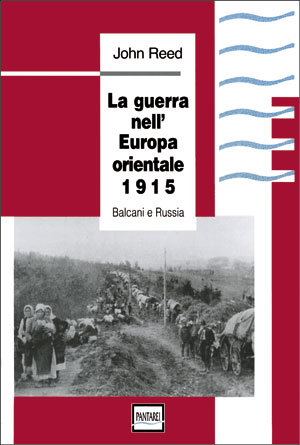
Nel 1918, dopo sette anni di guerra, massacri e «scambio di popoli» – così veniva chiamata all’epoca la «pulizia etnica» – i Balcani venivano «stabilizzati» dai vincitori i quali ricostituivano lo Stato serbo e, appagandone le «aspirazioni», lo facevano divenire Jugoslavia confermando le conquiste del 1912 e 1913 e donandogli il Montenegro, la Vojvodina, la Bosnia e l’Erzegovina, la Dalmazia, la Croazia e la Slovenia. Gli imperialismi vincitori della Prima guerra mondiale miravano a sbarrare in tal modo la strada meridionale al concorrente tedesco, creando sotto la coltre del nuovo ordine un più vasto «groviglio balcanico», disseminato di trabocchetti etnici e religiosi, permeabile alle scorribande di ogni tipo di predoni.
Di una fase di questo processo fu testimone diretto un «inviato speciale» d’eccezione: il giornalista americano John Reed «un uomo che sapeva vedere e ascoltare» – secondo la definizione di Lev Trotsky – e scrivere senza il velo delle ideologie, come testimoniano queste corrispondenze redatte nel 1915.
Tre volte nel secolo scorso il materiale infiammabile di cui è intriso il «groviglio balcanico» è andato a fuoco e sempre abbiamo visto accalcarsi intorno alla miccia, in lotta per le sfere d’influenza, i comparti dell’imperialismo europeo, l’imperialismo russo, quello d’Oltreoceano.
Mentre «la faglia sismica dei Balcani», oggi attratta dal campo gravitazionale dell’imperialismo europeo, non si è ancora assestata, è di sicuro interesse la lettura di queste pagine, inedite per l’Italia.
In 1918, after seven years of war, slaughters, and “exchange of peoples” – as “ethnic cleansing” was then called – the Balkan area was “stabilised” by the winning powers which recreated the State of Serbia and, fulfilling this latter’s “aspirations”, made it become Yugoslavia by sanctioning the conquests of 1912-13 and giving it Montenegro, Vojvodina, Bosnia, Herzegovina, Dalmatia, Croatia, and Slovenia. The imperialist winners of the First World War aimed at barring their German competitor from the southern route, thus creating a larger “Balkan morass” under the cover of the new order, scattered with ethnic and religious pitfalls, and open to the raids of every kind of predators. A stage in this process was directly witnessed by an outstanding “special correspondent”, the American journalist John Reed, “a man who could see and listen” – according to Lev Trotsky’s definition – through the veil of ideology, as testified by this correspondence written in 1915. Three times in the last century the inflammable material in the “Balkan morass” has burst into flames and the sections of European, Russian, and American imperialism have always been seen crowded around the fuse, struggling against each other for spheres of influence. While “the Balkan seismic fault” has not been settled yet, and is now being attracted by the gravitational field of European imperialism, the reading of this book is of great interest. |
Prima edizione 1997, seconda edizione 2009; rilegato, 304 pagine
Illustrato
Cronologia; indice dei nomi con notizie biografiche e dei luoghi con riferimenti geografici
1997, second edition 2009, hardcover, 304 pp., chronological tables, index of places, biographies, index of names |



